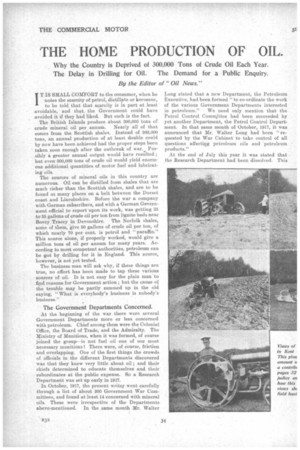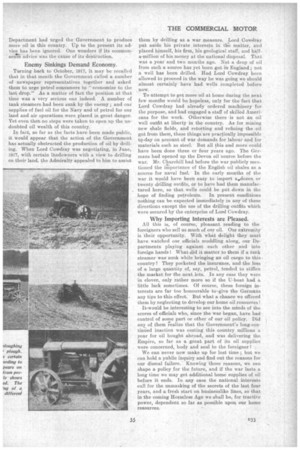THE HOME PRODUCTION OF OIL.
Page 12

Page 13

If you've noticed an error in this article please click here to report it so we can fix it.
Why the Country is Deprived of 300,000 Tons of Crude Oil Each Year.
The Delay in Drilling for Oil. The Demand for a Public Enquiry.
By the Editor of " Oil News.
IT IS SMALL COMFORT to the oonsumer, when he notes the scarcity of petrol, distillate or kerosene, to be told that that scarcity is in part at least avoidable, and that the Government could have avoided it if they had liked. But such is the fact.
The British Islands produce about 300,000 tons of crude mineral oil per annum. Nearly all of that comes from the Scottish shale. Instead of 300,000 tons, an annual production of at least double could by now have been achieved had the proper steps been taken soon enough after the outbreak of war.. Possibly a greater annual output would have resulted; but even 300,000 tons of crude oil would yield enormous additional quantities of motor fuel and lubricating oils.
The sources of mineral oils in this country are numerous. Oil can be distilled horn shales that are much richer than the Scottish 'shales, and are to be found at many places on a, belt between the Dorset coast and Lincolnshire. Before the war a company with German subscribers, and with a German Government official to report upon its work, was getting 33 to 35 gallons of crude oil per ton from lignite beds near Bovey Tracey in Devonshire. The Norfolk shales, some of them, give 50 gallons of crude oil per ton, of which nearly 70 per cent. is petrol and "paraffin." This source alone, if properly worked, would give a million tons of oil per annum for many years. According to most competent authorities, petroleum can be got by drilling for it in England. This source, however, is not yet tested.
The business man will ask why, if these things are true, no effort has been made to tap these various sources of oil. It is not easy for the plain man 'to find reasons for Government action ; but the cause of the trouble may be partly summed up in the old saying, "What is everybody's business -is nobody's business." .
The Government Departments Concerned.
At the beginning of the war . there were several Government Departments more or less concerned with petroleum. Chief among them were the Colonial Office, the Board of Track, and the Admiralty. The Ministry of Munitions, when it was formed, of course joined the group—is not fuel oil one of our most necessary munitions 7 There were, of Course, friction and overlapping. One of the first things the crowds of officials in the different Departments discovered was that they knew very little about oil ; and their chiefs determined to educate themselves and their subordinates at the public expense. So a Research Department was set up early in 1917.
In October, 1917, the present writer went carefully through a list of about 200 Government War Committees, and found at least 14 concerned with mineral oils. These were irrespective of the Departments above-mentioned. In the same month Mr. Walter Long stated that a new Department, the Petroleum Executive, had been formed "to co-ordinate the work of the various Government Departments interested in petroleum." We need only mention that the Petrol Control Committee had been succeeded by yet another Department, the Petrol Control Department. In that same month of October, 1917, it was announced that Mr. Walter Long had been "requested by the War Cabinet to take control of all questions affecting petroleum oils and petroleum products."
At the end of July this year it was stated that • the Research Department had been dissolved. This Department had urged the Government to produce more oil in this country. Up to the present its ad vice has been ignored. One wonders if its common... sense advice.was the cause of its destruction.
Enemy Sinkings Demand Economy.
Turning back to October, 1917, it may be recalled that in that month the Government called a number of newspaper representatives together and asked them to urge petrol consumers to "economize to the last drop." As a matter of fact the position at that time was a very serious one indeed. A number of tank steamers had been sunk by the enemy ; and our supplies of fuel oil for the Navy and of petrol for our land and air operations were placed in great danger. Yet even then no steps were taken to open up the undoubted oil wealth of this country.
In fact, so far as the facts have been made public, it would appear that the action of the Government has actually obstructed the production of oil by drilling. When Lord Cowdray was negotiating, in June, 1917, with certain landowners with a view to drilling on their land. the Admiralty appealed to him to assist them by drilling as a war measure. Lord Cowdray put aside his private interests in the matter, and placed himself, his firm, his geological staff, and halfa-million of his money at the national disposal. That was a year and two months ago. Not a drop of oil from such a source has yet been got in England; not a well has been drilled. Had Lord Cowdray been allowed to proceed in the way he was going we should almost certainly have had wells completed before now.
To attempt to get more oil at home during the next few months would be hopeless, only for the fact that Lord Cowdray had already ordered machinery for the purpose, and had engaged a staff of skilled Americans for the work. Otherwise there is not an oil well outfit at liberty in the country. As for mining new shale fields, and retorting and refining the oil got from them, these things are practically impossible to-day on account of war demands for labour and for materials such as steel. But all this and more could have been done three or four years ago. The Germans had opened up the Devon oil source before the war. Mr. Churchill had before the war publicly mentioned the iniportance of the English oil shales as a source for naval fuel. In the early months of the war it would have been easy to import adozen or twenty drilling outfits, or to have had them manufactured here, so that wells could be put down in the hope of finding petroleum. In present conditions nothing can be expected immediately in any of these directions except the use of the drilling outfits which. were secured by the enterprise of Lord Cowdray.
Why Importing Interests are Pleased.
All this is, of course, pleasant reading to the foreigners who sell us much of our oil. Our extremity is their opportunity. With what 'delight they must have watched our officials muddling along, our Departments playing against each other and into foreign hands ! What did it matter to them if a tank steamer was sunk while bringing an oil cargo to this. country ? They pocketed the insurance, and the loss of a large quantity of, say, petrol, tended to stiffen the market for the next lots. In any case they were in clover, only rather more so if the U-boat had a little luck sometimes. Of course, these foreign interests are far too honourable to-give the Germans any tips to this effect. But what a chance we offered them by neglecting to develop our home oil resources It-would be interesting to see into the minds of the scores of officials who, since the war began, have had control of some part or other of our oil policy. Did any of them realize that the Government's long-continued inaction was costing this country millions a year for -oil bought abroad, -and was delivering the Empire, so far as a great part of its oil supplies were concerned, body and soul to the foreigner We can never now make up for lost time ; but we can hold a public inquiry and find out the reasons for our dismal failure. Knowing those reasons, we can shape a policy for the future, and if the war lasts a long time we may get additional home supplies of oil before it ends. In any case the national interests call for the unmasking of the secrets of the last four years, and a fresh start on businesslike lines, so that in the coming Horseless Age we shall be, for tractive power, dependent so far as possible upon our home resources.






















